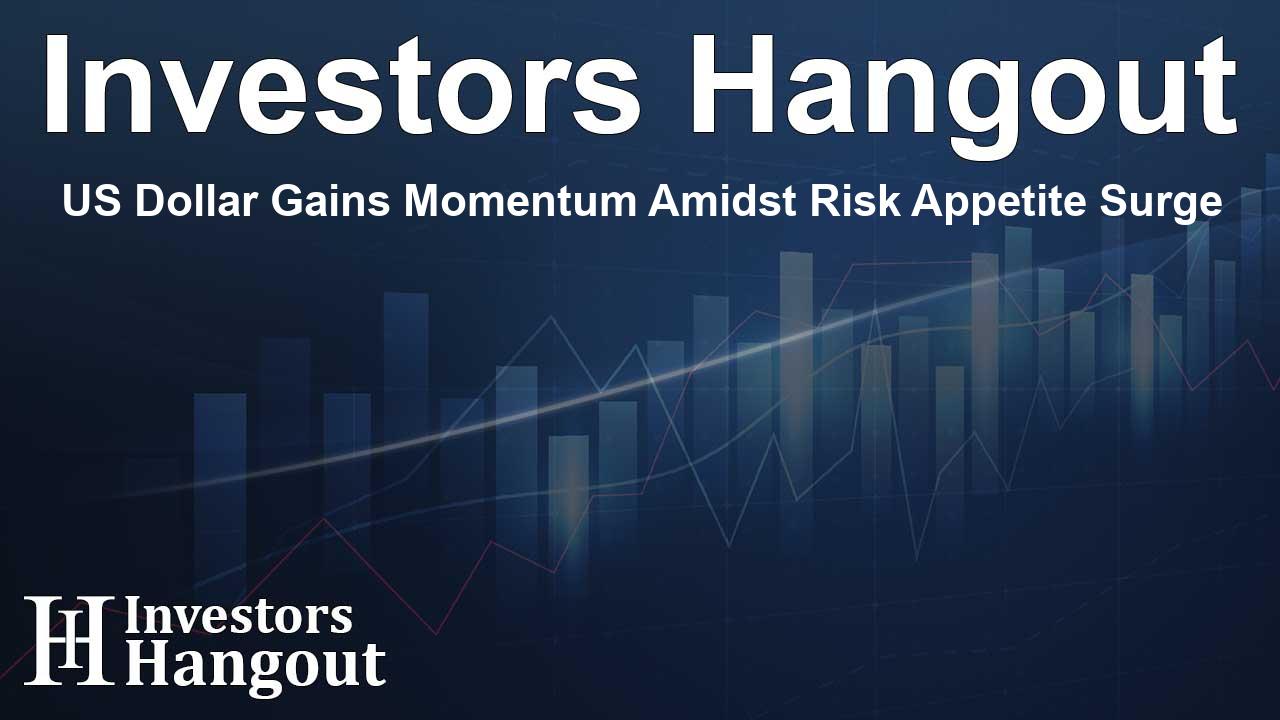US Dollar Gains Momentum Amidst Risk Appetite Surge

US Dollar Rises with Growing Risk Appetite
The US dollar is embarking on a strong journey, beginning the week on a notable upswing. This positive shift is largely driven by an enhanced risk appetite that has emerged in the financial markets. The newly forged US-EU trade agreement is a significant factor contributing to the greenback's increased attractiveness. At the time of writing, the euro has taken a hit, quickly dropping below 1.1550, which effectively nullifies its prior gains since mid-summer. This dollar strength is also evidenced against various currencies, even both risk-on and safe-haven pairs, showcasing the dollar's robust position in the market.
US equity markets are also on the rise, with indexes like the S&P 500 and the Nasdaq 100 continuing their upward trajectories. Investors are keenly observing the unfolding company earnings season, with key players such as Visa providing insights into the health of American consumers. The spotlight is shifting towards upcoming earnings reports from tech giants like Microsoft, Meta, Apple, and Amazon. Strong performances from these companies could serve to bolster the current bullish outlook for US stocks, as leading investment banks revise their year-end targets positively.
One noticeable victim of this dollar momentum has been gold, which has seen a swift retreat from a one-month high of $3,439. Presently, it is testing the crucial support level at the 50-day simple moving average set at $3,323. The next significant support level appears at $3,260. Interestingly, oil prices have remained stable, even as market sentiment shifts, showing little response to recent comments suggesting potential diplomatic movements in the Eastern European region.
Currently, oil prices are trading within the $65-69 range, with many awaiting key economic indicators such as PCE and jobs data expected to be released this week. These figures will undoubtedly influence trading strategies moving forward.
European Concerns Over US-EU Trade Deal
Interestingly, while US equities thrive courtesy of the recent trade agreement between the US and the EU, European markets seem to be lagging behind. Initially welcomed, the deal is now under scrutiny from European leaders as they express discontent regarding several specific aspects. The agreed tariff level of 15% has caused concern, and the commitment made by the EU to purchase $750 billion worth of energy over the next three years seems overstated compared to historical purchasing patterns.
The ambitious goals set forth, particularly concerning the shift from Russian gas to significantly pricier US LNG, raise questions about their feasibility. The EU is grappling with internal dissent, especially from France and Germany, who feel sidelined in these negotiations. German Chancellor Merz has warned that tariffs could weigh heavily on the German economy, while former French Prime Minister Michel Barnier has labeled the deal as an inadequate compromise that jeopardizes long-term regional welfare.
As tensions rise, leaders in Europe are left to ponder whether it is worth risking a breakdown of the deal to avoid facing potentially overwhelming tariffs in the future.
Implications of the Upcoming Tariff Deadline
With trade agreements beginning to unfold, attention turns toward the impending August 1 deadline regarding the extension of reciprocal tariffs. Countries like Canada are hustling to finalize agreements to preempt the introduction of new tariffs that could hamper their economies. The possibility of a broad “world tariff” looms, potentially hovering around the 15-20% mark, depending on how negotiations progress.
Quiet Day Ahead for Financial Markets
As investors count down to important updates expected later in the week, the current day’s events on the economic calendar appear subdued. Anticipated reports stemming from housing data and the Consumer Confidence Index could have significant ramifications on the market's trajectory. Additionally, the upcoming 7-year US Treasury auction might lead to surprises, especially with recent announcements indicating a substantial borrowing need totaling $1.01 trillion for the current quarter. Investors will keep a watchful eye on the outcomes of these forthcoming announcements.
Frequently Asked Questions
What is driving the rise of the US dollar?
The rise of the US dollar is primarily driven by improved risk appetite following a favorable US-EU trade agreement.
How is the US equity market reacting to recent developments?
US equity markets are reacting positively, with major indexes witnessing continued rallies as earnings season unfolds.
What impact has the US-EU trade deal had on gold prices?
The dollar's strength resulting from the trade deal has negatively impacted gold prices, which have retreated from their recent highs.
Why are European leaders dissatisfied with the trade agreement?
European leaders are concerned about the high tariff rates and the ambitious commitments regarding energy purchases that may not be feasible.
What should investors look out for in the coming days?
Investors should monitor key economic indicators and earnings reports that could influence market conditions and trading sentiments.
About The Author
Contact Olivia Taylor privately here. Or send an email with ATTN: Olivia Taylor as the subject to contact@investorshangout.com.
About Investors Hangout
Investors Hangout is a leading online stock forum for financial discussion and learning, offering a wide range of free tools and resources. It draws in traders of all levels, who exchange market knowledge, investigate trading tactics, and keep an eye on industry developments in real time. Featuring financial articles, stock message boards, quotes, charts, company profiles, and live news updates. Through cooperative learning and a wealth of informational resources, it helps users from novices creating their first portfolios to experts honing their techniques. Join Investors Hangout today: https://investorshangout.com/
The content of this article is based on factual, publicly available information and does not represent legal, financial, or investment advice. Investors Hangout does not offer financial advice, and the author is not a licensed financial advisor. Consult a qualified advisor before making any financial or investment decisions based on this article. This article should not be considered advice to purchase, sell, or hold any securities or other investments. If any of the material provided here is inaccurate, please contact us for corrections.
